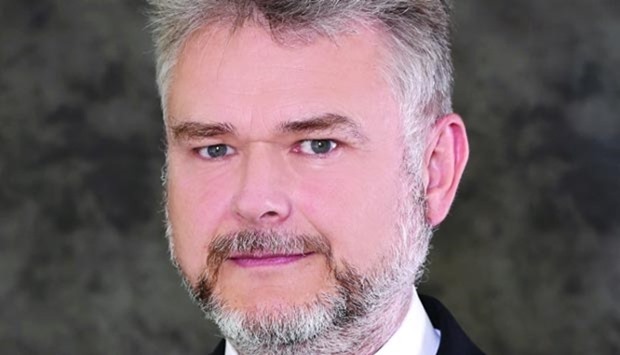They have also discovered an extensive Abbasid-period occupation of the area, according to a top official of UCL Qatar.
“UCL researchers have completed a season of test excavations at Fuwairit, the location of a historic town of Qatar and now an archaeological site, and conducted a survey and opened test trenches in the Mleiha area near Umm al-Ma in northwestern Qatar,” Prof Thilo Rehren, director, UCL Qatar, told Gulf Times.
The survey revealed a long occupation in the northwestern desert: numerous bedouin campsite remains of the 19th-20th century were clustered around the Mleiha depression, where water can be found and where the grazing is good.
The landscape also revealed a large number of pre-Islamic burial monuments, probably of the first two or three centuries AD, as well as an extensive Abbasid-period occupation of the area.
The team undertook scientific work to establish the ancient environment of the area and whether it has changed through time.
"Taken together, the information will teach us about past nomadic and settled life in Qatar,” observed Prof Rehren while explaining they are still working on material recovered from joint excavations in Doha with Qatar Museums.
"At Fuwairit we have established that there were several phases of occupation and abandonment, probably going back to the 18th century AD and continuing into the early 20th century,” he noted.
“We discovered a new part of the site, comprising a small, separate walled town to the north of the main site. Our work has given us a good idea of what to target next season, when we hope to open up bigger areas of the site and learn more about life in Qatar in the time before Doha became its capital,” Rehren said.
Both the projects, "Origins of Doha and Qatar Project" and "The Crowded Desert Project", are funded by Qatar National Research Fund.
Prof Rehren disclosed that they had earlier conducted some research at Bidda Park which established that the archaeological remains of an early town were buried beneath the modern park, but they did not dig there this season.
The official maintained that all the faculty and students of the university were involved in research as UCL is a research-intensive university.
“There is a very wide range of research initiatives we are involved in, from the role of the major museums here in Qatar and the importance of cultural heritage more generally in the modern world. But the emphasis of all our work is strongly on research for the benefit of Qatar, directly or indirectly, and the vast majority of our activities take place here in Doha,” he added.
There are two main activities which are central to the university’s efforts in Qatar. "The first one is the provision of short intensive training courses for professionals already in positions in the museum sector and related fields. The other is public engagement - reaching out to communities that normally have less contact with higher education,” Prof Rehren said.
“UCL researchers have completed a season of test excavations at Fuwairit, the location of a historic town of Qatar and now an archaeological site, and conducted a survey and opened test trenches in the Mleiha area near Umm al-Ma in northwestern Qatar,” Prof Thilo Rehren, director, UCL Qatar, told Gulf Times.
The survey revealed a long occupation in the northwestern desert: numerous bedouin campsite remains of the 19th-20th century were clustered around the Mleiha depression, where water can be found and where the grazing is good.
The landscape also revealed a large number of pre-Islamic burial monuments, probably of the first two or three centuries AD, as well as an extensive Abbasid-period occupation of the area.
The team undertook scientific work to establish the ancient environment of the area and whether it has changed through time.
"Taken together, the information will teach us about past nomadic and settled life in Qatar,” observed Prof Rehren while explaining they are still working on material recovered from joint excavations in Doha with Qatar Museums.
"At Fuwairit we have established that there were several phases of occupation and abandonment, probably going back to the 18th century AD and continuing into the early 20th century,” he noted.
“We discovered a new part of the site, comprising a small, separate walled town to the north of the main site. Our work has given us a good idea of what to target next season, when we hope to open up bigger areas of the site and learn more about life in Qatar in the time before Doha became its capital,” Rehren said.
Both the projects, "Origins of Doha and Qatar Project" and "The Crowded Desert Project", are funded by Qatar National Research Fund.
Prof Rehren disclosed that they had earlier conducted some research at Bidda Park which established that the archaeological remains of an early town were buried beneath the modern park, but they did not dig there this season.
The official maintained that all the faculty and students of the university were involved in research as UCL is a research-intensive university.
“There is a very wide range of research initiatives we are involved in, from the role of the major museums here in Qatar and the importance of cultural heritage more generally in the modern world. But the emphasis of all our work is strongly on research for the benefit of Qatar, directly or indirectly, and the vast majority of our activities take place here in Doha,” he added.
There are two main activities which are central to the university’s efforts in Qatar. "The first one is the provision of short intensive training courses for professionals already in positions in the museum sector and related fields. The other is public engagement - reaching out to communities that normally have less contact with higher education,” Prof Rehren said.

